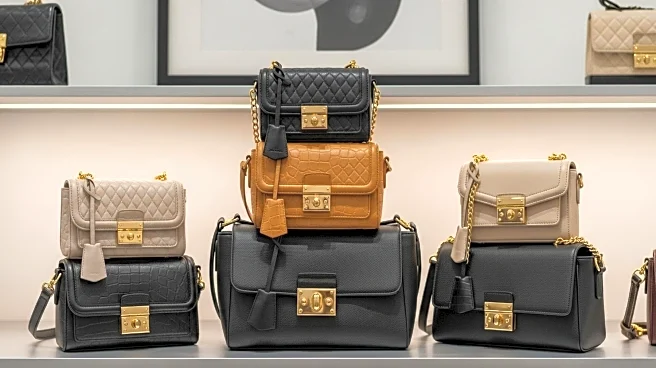What's Happening?
Gen Z consumers are increasingly purchasing 'dupes,' which are affordable alternatives to expensive name-brand items. This trend is driven by the generation's focus on cost transparency and value, as highlighted by a recent PwC survey where 82% of Gen Z shoppers expressed plans to buy dupes during the holiday season. These products span various categories, including bags, cosmetics, apparel, and footwear. The dupes culture is celebrated on social media as a sign of being a smart shopper, contrasting with previous generations who might have felt guilty about such purchases. Shikha Jain from Simon-Kucher notes that dupes are not counterfeit but rather products that closely resemble high-end items without claiming to be the original brand.
Why It's Important?
The growing popularity of dupes among Gen Z reflects broader economic trends, including inflation and economic uncertainty, which have heightened the importance of affordability and value. This shift could impact luxury brands, as younger consumers prioritize accessible aesthetics and quality over high-priced status items. As Gen Z shoppers gain wealth, they may eventually trade up to designer products, but for now, dupes offer a way to participate in trends without financial strain. This trend also underscores a cultural shift towards thrifting, resale, and upcycling, making these practices more mainstream and highlighting Gen Z's financial prudence.
What's Next?
As the dupes trend continues, luxury brands may need to adapt their strategies to appeal to cost-conscious consumers. This could involve offering more affordable lines or emphasizing the unique qualities of their products that cannot be replicated by dupes. Additionally, the economic landscape will play a significant role in shaping consumer behavior, with inflation and economic uncertainty potentially driving more consumers towards dupes. Brands and retailers might also explore collaborations with dupe manufacturers to capture this growing market segment.
Beyond the Headlines
The rise of dupes raises ethical questions about intellectual property and the fine line between imitation and innovation. While dupes are not counterfeit, they challenge traditional notions of brand value and exclusivity. This trend could lead to legal debates over design patents and the protection of brand identity. Culturally, the acceptance of dupes reflects a shift towards valuing practicality and financial savvy over brand loyalty, potentially influencing future consumer behavior and marketing strategies.








